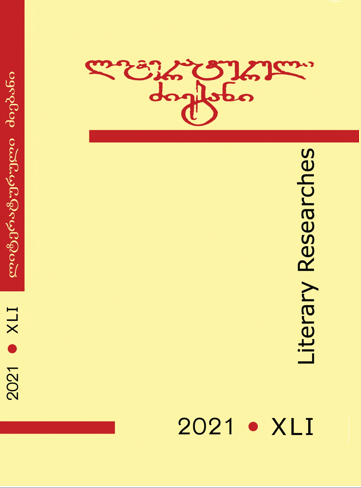Published 2021-12-20
Keywords
- Vepkhistqaosani,
- Vakhtang VI,
- Worldview,
- Tropological Perspectives
How to Cite
Abstract
The creative kinship of the founder of Rustavely Studies and editor of the first printed edition of Vepkhistqaosani, Vakhtang VI is known not only by his scholarly work (“The Translation of Vepkhistkaosani”), but also by his original works. Along with the important novelties which are manifested in Vakhtang’s works, the continuation of Rustaveli’s trends both in worldview and in tropological terms is obvious. Vakhtang’s aesthetic credo on the purpose of the poetry, the forms and principles of embodiment are close or coincide with Rustaveli’s concept. In this regard special attention should be payed to the poem Satrfialoni, in which the king talks about the essence of the poetry and refers to Rustaveli. He underlines the cognitive and aesthetic functions of the poetry. Reffering to Rustaveli Vakhtang also speaks about the three kinds of poetic genres (in modern terminology: epic, lyric and entertaining, humorous verses), According to him, poetry should be “checked in three or four variations”, which means the versatility of artistic narration, the ability to perceive and comprehend it in different interpretations.
For King Vakhtang as well as for Rustaveli, love is divine manifestation. His love lyric is of allegorical and mystical content and is based on Biblical-Christian theological symbolism. He first “recognized” the theory of divine love expounded by Rustaveli.
In Vakhtang’s poetry, the theme of the destiny is important. Although in many verses the king feels bitterness at the betrayal and falsity of the transient world, he believes that a man should leave his trace to descendants and attain the grace. His most important achievement is a good name. In that, the king obviously repeats Rustaveli’s aphorism: “The valorous knight craves glory, he cares little for booty” (799). In King Vakhtang’s poetry, there are allusions and associations of some episodes of Vepkhistkaosni . The paper discusses 11 of such cases.
These examples show the closeness of Vakhtang VI to Rustaveli is just one of the important facets of the king’s literary work. He managed to be self-sufficient, innovate and had many followers.

